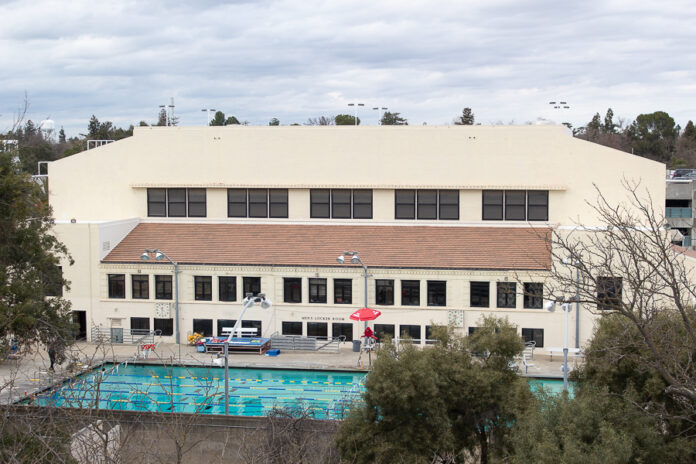Liability, health concerns, fees threaten to end program serving Davis homeless population
UC Davis student organization Homeless Outreach through Prevention and Education has been fundraising and raising student awareness in an attempt to save the Showers Program — a program that allows individuals experiencing homelessness to use Hickey Gym’s athletic showers for one hour on Sundays.
Two years ago, UC Davis women’s water polo coach Jamey Wright began the Showers Program after an experience volunteering with the Interfaith Rotating Winter Shelter, in which a guest needed to use a shower. Wright then developed the idea to use the Hickey Gym showers — as he noticed that the facility was underutilized on Sundays — and worked with the athletic department to start the program in December 2016.
Wright said that when he met with department leadership, he offered ideas of how the program would benefit the department and the community.
“I said really, the bottom line of why we’ve got to do this is because it’s the right thing to do, and it doesn’t cost us anything, really,” Wright said. “And the other thing is […] this really provides an opportunity for the coaches volunteering to help be there [to] run it, monitor it, [and] if they want to bring their athletes, I think it’s a great way to develop empathy.”
Wright said the program ran smoothly, with a small handful of participants — about six to nine, but at times as many as 12 individuals — coming each week. They signed simple waivers releasing the department, university and Wright from liability, and received towels and soap to use, donated by community members, the Davis Water Polo Club and athletes. In addition, Wright said he notified the UC Davis Police Department most days the program happened.
After an incident in July 2018 prompted police action, however, the Showers Program’s viability was called into question. Wright explained what happened.
“Someone who had not been part of our regular group that would come in got a bit disruptive, and so they called the campus police, and they came,” Wright said. “There was no confrontation at Hickey with this guy, but the officer that showed up was concerned. He said, ‘Yeah, I think you guys really want to rethink what you’re doing here.’”
A few weeks after the incident, the Showers Program was discontinued.
According to Wright, the athletic department had been supportive of the program, but this situation affected its willingness to continue.
“They were the ones that embraced it in the beginning and were very supportive, and I think they just got a little gun-shy when, well, maybe there’s some concerns there, maybe there’s some liability we haven’t really assessed and maybe somebody else can champion this cause for a while instead of us,” Wright said.
Already, IRWS — which partnered with the Showers Program each winter — has stepped in to continue the program after its hiatus in the late summer and fall of 2018. IRWS rented the space from the university and used its existing liability insurance to cover the program, but as IRWS only runs from Dec. 2 to Mar. 17, this was a short-term solution.
After this winter season ends, HOPE — which began volunteering with the Showers Program last summer — wants to make sure that the program continues. HOPE anticipates a need for about $500 to $600 of funding, and to this end has hosted a bake sale. In order to spread awareness, HOPE will also host a film screening and panel about homelessness on Mar. 2 at 123 Sciences Lecture Hall.
Wright said this funding may or may not allow the program to continue.
“The university would have to approve it [at] some level in there,” Wright said. “Somebody has to say, we’re going to sponsor this thing, and then they have to feel comfortable with it.”
Julia Nguyen, a third-year global disease biology major at UC Davis and outreach coordinator with HOPE, spoke about her motivation to fight for the program’s continuation.
“As a club, as volunteers, we saw how important the showers were to everyone in the community,” Nguyen said. “To have the showers here and [see] the gratitude that’s expressed by all of the participants to us volunteers was just, we knew how important it was.”
HOPE also sought to address health concerns by reaching out to CommuniCare Health Centers for a professional opinion about the program. Melissa Marshall, the chief medical officer at CommuniCare Health Centers, provided a written statement.
“While one cannot say that health risks are non-existent, they are certainly negligible in light of exercising standard precautions and providing hygiene access to this vulnerable population,” the statement said.
Nguyen said that the program serves as an important bridge between students and the city of Davis.
“It’s our job to say that we want these facilities to be used in […] inclusive ways, and we want them to be used in ways which foster a sense of community,” Nguyen said. “That’s one of the principles of UC Davis — we have principles of community. So I think that’s very relevant to how we can play a role in this, and […] the city is linked to the UC Davis campus [by] the fact that we need to be advocates together.”
Written by: Anne Fey — city@theaggie.org





